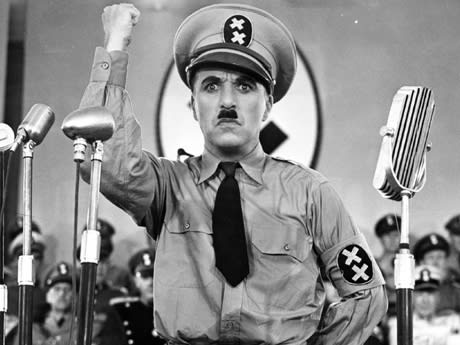The burly policemen and neighbourhood bullies who hassled the Little Tramp in Charlie Chaplin's silent films have morphed into stormtroopers in The Great Dictator (1940), Chaplin's first talkie and last film featuring a Tramp-like character. The Tramp, for his part, has also changed; he's now a Jewish barber, returning to a Jewish ghetto in the European nation of Tomania after 20 years in the hospital to find the country ruled by anti-Semitic tyrant Adenoid Hynkel. The Barber has the usual Chaplin-esque run-ins with the law, full of spilled paint and pratfalls and the occasional konk on the head, but when he dances past a block of storefronts marked "JEW," and the scene climaxes with a mob of stormtroopers nearly lynching him, the juxtaposition between slapstick and real-world atrocity becomes genuinely unsettling. For the first time, the man in the derby is facing an opponent whose violence exceeds a simple kick to the rear. If The Great Dictator has inevitably lost some of its urgency, 71 years of perspective has made its tragic elements even more resonant: the stormtroopers may "look like a paunchy group of Keystone Kops," as Chaplin expert Dan Kamin says in a commentary track, but they're still stormtroopers, and they're still very capable of killing our beloved friend, the little man in the derby. With Hitler now officially designated History's Greatest Monster, it's easy to forget what a brave and risky film this was. The first major Hollywood film to directly attack the Nazis, and the only one of the period to specifically condemn anti-Semitism, The Great Dictator was released a full year before the United States entered the war, and caused controversy among pacifist and pro-Nazi elements. It became Chaplin's biggest box office success, but also established him as a leftist political figure in the public eye, planting the seeds for his fall from public favour. The Great Dictator has, of course, plenty of wonderful comic scenes: Hynkel's pathetic game of one-upmanship with rival dictator "Benzino Napaloni" (Jack Oakie); the Barber shaving a customer to the tune of Brahms' "Hungarian Dance"; and Hynkel's iconic dance with a balloon globe. It's also Chaplin's most sorrowful work: has there ever been a more chilling single image in cinema than everyone in the ghetto fleeing into their houses during a Hynkel speech, leaving the Barber alone on the sidewalk? Chaplin navigates humour and sorrow with astonishing ease, and this 125-minute film has the length and scope of an epic with the earnestness and eccentricity of a deeply personal artistic statement (see: the semi-notorious final scene where Chaplin more or less steps out of character to deliver a six-minute speech). Like Chaplin's other socio-political masterpieces, Modern Times (1936) and Monsieur Verdoux (1947), The Great Dictator is a rare achievement: a film firmly of its moment that somehow stands outside of time. Criterion Collection extras include an excellent, thorough commentary by Kamin and Hooman Mehran, and colour home movies of the production, including glimpses of Chaplin directing. Also worthwhile is Kevin Brownlow's documentary, The Tramp and the Dictator, which reveals that, yes, a print of The Great Dictator found its way to Hitler, and he watched it. Alone. Twice.
(Criterion)The Great Dictator [Blu-Ray]
Charles Chaplin

BY Will SloanPublished May 27, 2011